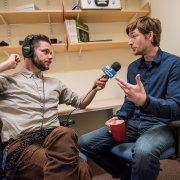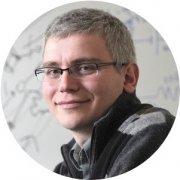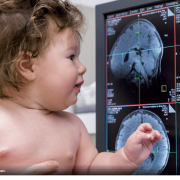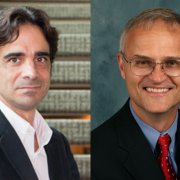April 14, 2017 - 3:45 pm
Amnon Shashua PhD ’93, co-founder of Mobileye, discusses challenges associated with autonomous vehicles in MIT visit.
MIT News | Around Campus
by Julie Pryor | McGovern Institute for Brain Research
April 13, 2017
"The field of transportation is undergoing a seismic shift with the introduction of autonomous driving — or computer-driven cars. Computer vision scientist and Mobileye co-founder Amnon Shashua PhD ’93 described the challenges...
April 12, 2017 - 2:00 pm
David Vogel, Trustee (Voloridge Investment Management, LLC)
Abstract: The introductory portion of this talk will review some state-of-the-art machine learning techniques. We will discuss concepts of ensembles and popular methodologies within this category. We’ll touch upon collaborative filtering techniques used for recommendation systems, and we’ll present...
April 5, 2017 - 2:00 pm
The Curiosity Desk, a radio program on WGBH hosted by Edgar B. Herwick III, interviewed CBMM Postdoc Dr. Matt Peterson for a segment answering listener submitted questions. For the second part of the broadcast, Matt helped answer the question of "What are you looking at?". Listen in to find out the answer [starting at 2:13].
March 27, 2017 - 9:00 am
Stanford University, Palo Alto, CA
Understanding intelligence -how we may be able to replicate intelligence in machines, and how the brain produces intelligent behavior- is one of the greatest challenges in science and technology.
There are many aspects of human intelligence which have been impossible so far to replicate in...
There are many aspects of human intelligence which have been impossible so far to replicate in...
March 24, 2017 - 4:30 pm
Amnon Shashua - Hebrew University, Co-founder, CTO and Chairman of Mobileye
Abstract: The field of transportation is undergoing a seismic change with the coming introduction of autonomous driving. The technologies required to enable computer driven cars involves the latest cutting edge artificial intelligence algorithms along three major thrusts: Sensing, Planning and...
March 23, 2017 - 9:00 am
This meeting is invitation only.
March 13, 2017 - 12:30 pm
By MARK SCOTT for the New York Times
"Intel agreed on Monday to pay $15.3 billion for Mobileye, an Israeli technology company that specializes in making sensors and cameras for autonomous cars, as the global microchip giant tries to expand its reach in the fast-growing sector.
The deal follows a growing partnership between Intel and Mobileye. In January, the companies announced plans to have up to 40 autonomous cars on American and European...
March 3, 2017 - 4:00 pm
Samuel Gershman
March 3, 2017 - 3:00 pm
We will be meeting to discuss our center’s upcoming External Advisory Committee (EAC) Meeting (March 23rd & 24th) and NSF STC Site Visit (May 15th-17th.) CBMM Research Thrust Leaders will discuss overall goals for these events, as well as coordinate the respective poster sessions.
February 24, 2017 - 4:00 pm
Nathan Wilson Ph.D., Co-founder and CTO of Nara Logics
Title: Practical Approaches to Industry AI Inspired by Principles of Synaptic Computation
Abstract: Artificial cognitive systems are beginning to arise in organizations with an emerging nature and structure. Neuroscientific principles are poised to transform this landscape for reasons that we will...
Abstract: Artificial cognitive systems are beginning to arise in organizations with an emerging nature and structure. Neuroscientific principles are poised to transform this landscape for reasons that we will...
February 21, 2017 - 4:00 pm
Ilya Nemenman (Emory College)
Abstract: Last two-three decades have convinced the computational neuroscience community that sensory neurons encode information about the world not just in their firing rate, but also in the precise timing of their action potentials. However, whether this information is used by animals to actually...
Applications now open for Brains, Minds and Machines Summer Course 2017; New Deadline: April 7, 2017
February 14, 2017 - 3:30 pm
Update: the application deadline for the BMM Summer Course has been extended until Friday, April 7, 2017.
Brains, Minds and Machines Summer Course 2017
A Special Topics Course at MBL Woods Hole, MA
Directors: Gabriel Kreiman, Children’s Hospital, Harvard Medical School; and Tomaso Poggio, Massachusetts Institute of Technology
Course Date: August 13 – September 3, 2017
Application Deadline: April 7, 2017
More information: http://cbmm.mit.edu/...
February 13, 2017 - 10:45 am
Over the past couple of decades, researchers like Saxe have used functional MRI to study brain activity in adults and children. But fMRI, like a 19th-century daguerreotype, requires subjects to lie perfectly still lest the image become hopelessly blurred. Babies are jittering bundles of motion when not asleep, and they can’t be cajoled or bribed into stillness. The few fMRI studies done on babies to date mostly focused on playing sounds to them...
February 10, 2017 - 4:00 pm
Dr. Brian Subirana
, Dr. Bror Saxberg
In this talk, Brian Subirana will first review research conducted over the last 120 years since Ebbinghaus's seminal work in 1885 on the forgetting curve. This review (joint work in progress with Aikaterini Bagiati and Sanjay Sarma) aims to understand whether, and to what extent, what is learned in...
February 10, 2017 - 12:45 pm
Written by:
Phil Sharp 1,2
Susan Hockfield 3,4,†
Author Affiliations
1Institute Professor, Massachusetts Institute of Technology, Cambridge, MA 02139, USA.
2President of AAAS, 2014-2015.
3President Emerita, Massachusetts Institute of Technology, Cambridge, MA 02139, USA.
4AAAS President.
† Corresponding author. Email: hockfield@mit.edu
Science 10 Feb 2017:
Vol. 355, Issue 6325, pp. 589
DOI: 10.1126/science.aam8563
"THE...














